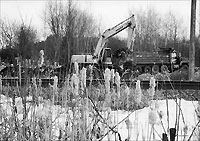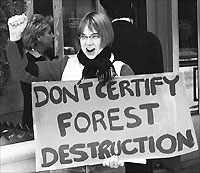|
Court Decision on Wetlands: 'Send in the Bulldozers'
By Jenny Coyle
An old sand and gravel mining operation, abandoned in 1960 after 30 years of use, was purchased in 1990 by a group of suburban Chicago cities in order to develop a landfill for non-hazardous waste.
 Much of the 533-acre site had transitioned to forest, and its excavation trenches had become permanent or seasonal ponds. The area had also become northeastern Illinois' second largest rookery for great blue herons. And 121 other bird species - including migratory birds - had been observed there, as had other wildlife. Much of the 533-acre site had transitioned to forest, and its excavation trenches had become permanent or seasonal ponds. The area had also become northeastern Illinois' second largest rookery for great blue herons. And 121 other bird species - including migratory birds - had been observed there, as had other wildlife.
No matter. The coalition of cities - the Solid Waste Agency of Northern Cook County, or SWANCC - wanted to dump waste there, and got the necessary state and county permits to do so. But the Army Corps of Engineers refused to issue a permit to fill the wetlands, saying the plan didn't satisfy Clean Water Act requirements to minimize environmental damage.
SWANCC appealed the decision all the way to the U.S. Supreme Court, which issued a ruling in January. In its 5-4 decision, the court said that because the ponds were "isolated" and not connected to any interstate waterway, the Army Corps had no jurisdiction - in spite of the presence of migratory birds. The ruling applies to vernal pools, prairie potholes, bogs and other stand-alone wetlands.
"The ruling pulls the rug out from under federal protections for wetlands that are critically important not only as habitat for birds, fish and wildlife, but also as areas for flood storage and water-pollutant filtration," said Robin Mann, a Pennsylvania resident who chairs the Club's Wetlands Working Group.
"Most states depend on the federal program to protect the wetlands within their borders," said Mann. "Now they'll have to figure out how to do it themselves - if they don't want to see a ramped-up assault on wetlands."
Ramped-up is right. In Marinette, Wis., for example, developers of Menard's, a home improvement store similar to Home Depot, had worked with the Army Corps to re-configure a construction plan to avoid four wetlands on its 22-acre building site. But in March, bulldozers were on site filling the wetlands.
"Now they know the Corps doesn't have authority over the wetland, so they're going ahead with their original plan," said Caryl Terrell, legislative coordinator for the John Muir (Wisconsin) Chapter.
In the past, Wisconsin law gave state officials authority to review projects approved by the Army Corps to certify that the plan wouldn't harm state water quality. But when the Corps' jurisdiction to approve projects was taken away, so was the state's discretion to certify. The Supreme Court decision has effectively removed both levels of protection. The good news is that a bill to restore the state's authority passed easily in the Wisconsin senate with a 27 to 6 vote just six weeks after the Supreme Court ruling.
Expecting a tougher battle in the Assembly, Club members sent a barrage of postcards, letters and faxes to decision-makers. And on the day of the vote, Terrell did something she's never done before: She donned a frog costume and stood with activists holding signs at the capitol.
"German tourists and visiting school kids loved it," she said, "but the Assembly still voted wrong."
Take Action:
Tell your representative and senators that you want them to stop any efforts to further weaken Clean Water Act laws and regulations protecting wetlands. Instead, they must support efforts to strengthen the act to address the effects of the Supreme Court ruling.
Also, join the listserve discussion on isolated wetlands that's open to all Club members. Send an e-mail to
listguard@sierraclub.org, with your eight-digit membership number in the subject line. In the message text, write: subscribe cons-eqst-water-forum.
Finally, add your name to the quick-action e-mail alert list of wetland activists. Send an e-mail indicating your interest to george.sorvalis@sierraclub.org.
For more information, contact Dirk Manskopf, (202) 675-7915; dirk.manskopf@sierraclub.org; or Robin Mann, (610) 527-4598;robin.mann@sierraclub.org; or check out www.sierraclub.org/wetlands.
A good roundup of states responding to the ruling is available at www.aswm.org.
New Yorkers Speak for the Trees
by Susan Holmes
Sierra Club Regional Representative, New York City
 Two years ago, a small group of activists in New York City decided they wanted to protect forests from the Great Bear Rainforest on the coast of British Columbia to the Amazon in South America. Inspired by the campaign to persuade Home Depot not to buy or sell wood from endangered forests, they hoped if they could get New York City, with its $38 billion dollar budget, to do the same, industry would have to respond. Two years ago, a small group of activists in New York City decided they wanted to protect forests from the Great Bear Rainforest on the coast of British Columbia to the Amazon in South America. Inspired by the campaign to persuade Home Depot not to buy or sell wood from endangered forests, they hoped if they could get New York City, with its $38 billion dollar budget, to do the same, industry would have to respond.
Well, 2,500 postcards, 400 letters, 50 conference calls, 25 tabling events, 20 lobby visits, 10 pizza dinners, eight lawyers and one media trip to Canada with The New York Times later, it has all come down to the next few weeks. The New York City Council will consider the bill the first week in May; then it's up to Mayor Rudy Giuliani to sign the legislation.
"Since the introduction of the bill in July, we've worked hard to build political support and our work is really paying off," said Donna DeCostanza, Good Wood Committee activist in New York. "Now we need the voices of as many people in the Sierra Club as possible to gain Giuliani's support."
Currently, much of the wood New York City uses in its building projects comes from endangered forests. In fact, wood from these jewels of biodiversity can be found on the seaside boardwalks of Coney Island to the park benches in Central and Riverside parks.
The "selective purchasing legislation" being considered by the city council promotes the purchase of sustainably harvested and managed wood in New York City contracts. The bill requires city agencies buy wood that has been certified by the Forest Stewardship Council, or its equivalent. The bill also encourages the use of reclaimed wood and wood alternatives, such as recycled plastic lumber.
The Good Wood legislation (Int. No. 784) was introduced by city council member Gifford Miller and speaker Peter Vallone in June 2000.
Take Action:
By May 20, write to New York City Mayor Rudolph Giuliani and urge him to set a precedent for the nation by passing the Good Wood legislation. Send the sample letter below, or write your own. Send it to:
The Honorable Rudolph Giuliani, c/o Sierra Club
116 John St., Suite 3100
New York, NY 10038
(The Atlantic Chapter will deliver it for you.)
Sample Letter:
Dear Mayor Giuliani,
From the temperate rainforests of Canada and Alaska to the tropical rainforests of the Amazon, the world's most critical forest ecosystems are threatened by clearcut logging. As one of the largest municipal users of wood in the United States, New York City bears a special responsibility to ensure that the wood it uses for city projects does not destroy these endangered forests.
Please make New York City a national example by supporting a policy to phase out wood from clearcut ancient forests and to buy Forest Stewardship Council-certified wood. If companies like Home Depot can do it, New York City can, too.
Sincerely,
(Please include your name, address and e-mail)
To find out more about introducing Good Wood legislation in your hometown, contact Susan Holmes, the Club's lead staff person on the issue in New York, at (212) 791-9291; susan.holmes@sierraclub.org.
Photo (top) courtesy Robert Rosenberger, (bottom) courtesy Emma McGregor-Mento
Up to Top
|